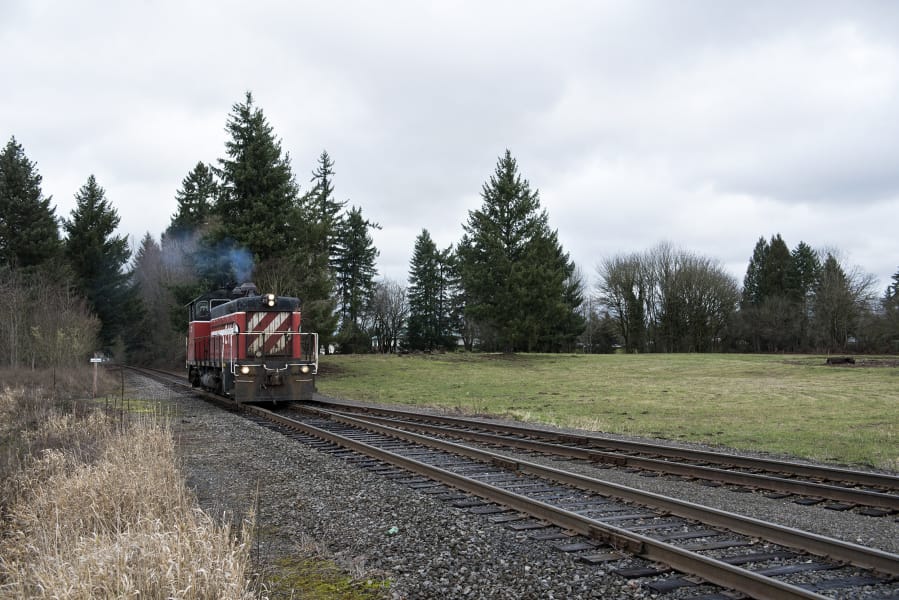Eric Temple remembers when Clark County was thinking about ripping up the 33 miles of railroad in Brush Prairie.
Since the 1990s the county had wanted to use the agricultural area lining the tracks for industrial jobs but had been stymied by the state’s land-use laws. But Temple said that in 2003, the county decided to give it another try and signed an agreement with Portland Vancouver Junction Railroad, the company Temple is president of, to operate the rail line.
Temple said that he’s grown his company to 850 cars that provide rail transport to a mix of industrial customers. He said more rail-oriented businesses have wanted to set up but were unable to find land nearby. Now Clark County is in the process of implementing a recent change to state land-use law that will allow companies to build new industrial facilities along that line, fulfilling the county’s long sought-after goal of creating an economic driver.
But David McDonald, a lawyer for local conservation group Friends of Clark County, said that the county’s process to implement the changes to land-use laws was heavily weighted towards Temple’s legal and financial positions. Through a public records request, McDonald obtained thousands of pages of emails and county documents that he said shows that Temple attempted to undermine county staff and that a county attorney was removed from the issue after he complained.
“The process seemed to be a bit polluted by the desires of Mr. Temple,” said McDonald, who stressed he’s not accusing the council or staff of wrongdoing.
McDonald said that interactions between Temple and the county may be legal and reasonable, but it demonstrates how dominant he was in the process even before the county created its public participation plan. He also pointed to a requirement under the Growth Management Act, the state’s overarching land-use law, that planning processes not give one group or entity too much influence.
Temple said he did have disagreements with county staff. He said it makes sense that the operator of the railroad would play an active role in such a key issue.
“Of course, I’m going to be very interested,” said Temple. “Of course, I’m going to be very involved in every step.”
Members of the county council, and others, point out that Temple didn’t get everything he wanted. They also say that staff wasn’t cut out of the process.
The county is currently preparing to implement the next phase of the law, and there are concerns that Friends of Clark County, which already has active legal challenges to the county’s land-use decisions, is preparing to appeal it.
‘Too slow and costly’
Last year, Gov. Jay Inslee signed Senate Bill 5517. The legislation modifies the Growth Management Act to allow rail-dependent industrial development on farmland next to 33 miles of rail in Clark County that would have easy access to both the Port of Vancouver and the Portland area. Proponents say this rare modification to the Growth Management could be a boon to Clark County.
Temple cited data from the Columbia River Economic Development Council showing that over 20 companies have inquired about setting up on rail-supported sites allowed by the new law. Their projects would create an estimated tens of thousands of jobs, according to the data.
“Year after year after year we’ve had to turn away companies,” said Temple.
Temple and members of the county council had hoped to swiftly implement the new law shortly after it went into effect in October by making zoning changes and drafting development regulations.
But at a council work session held in September, Community Planning Director Oliver Orjiako and Christine Cook, a senior deputy prosecuting attorney who handles land-use issues, recommended taking a cautious approach that included an amendment to the county’s comprehensive plan, a document required by state law that guides growth.
The process to amend it could take a year and members of the council were frustrated. At the session, Steve Horenstein and Jamie Howsley, two land-use lawyers hired by Temple, argued that the law clearly did not require a comprehensive plan amendment and could be directly implemented.
Emails show that Temple was also frustrated with staff’s recommendations and also felt the county could take a more direct path.
In September, Temple wrote the county council after attending a Railroad Advisory Board meeting complaining it left him “without a positive feeling.”
“The process staff is drafting is far too slow and costly, and also seems to indicate they have misinterpreted the purpose and statute supporting (state laws),” he wrote.
Prior to the work session, Temple wrote an email to the council suggesting that staff be given “practically ZERO time” to present and that his team be allowed to present their alternative.
“This proposal is so bad, it almost makes you wonder if it’s by design,” he wrote.
The same month Cook wrote to the council noting that Temple and a subcommittee of the Railroad Advisory Board met without informing or inviting staff, and “then, as I understand it, requested staff to be silent on implementation issues.”
Emails show that Temple particularly clashed with Cook. In July, he wrote to Cook about a disagreement over definitions in the law. He asked to “move forward as a team!”
Cook wrote back pointing out that her “job is to represent my client, Clark County.” Further emails show Temple writing to Jerry Barnett, a project manager in Clark County Department of Public Works, that Cook was “completely wrong on the law.” In another email to staff and councilors he wrote that he was frustrated after spending 30 minutes on the phone with her.
In October, Cook wrote an email stating that she had “been pulled” from working on the implementation of the bill and that Chris Horne, chief civil deputy prosecutor who has since retired, would take over. Temple responded with an email to the county council thanking them for asking Horne to take over. The emails offered no explanation for why Cook had been pulled.
“Based on those records it appears that Mr. Temple influenced what lawyer would be advising the county,” said McDonald.
Council Chair Marc Boldt said the decision to remove Cook came from the Prosecuting Attorney’s Office. In an email, Cook didn’t provide an explanation but said that she continues to provide advice on issues related to the implementation of the law.
Temple said he’s an “open book” about where he stands. He said there was some “sausage-making” and he “butted heads” with Cook. He said the county had ample time to review the legislation when it was being considered in Olympia and he wishes they had paid closer attention to what its authors said it allows.
“This is a real source of frustration for me,” he said.
McDonald also complained that Temple picked members of a subcommittee of the Railroad Advisory Board that worked on implementing the law. Temple said he just suggested some names of knowledgeable people and had “zero influence.” Daniel Weaver, the board’s chair, agreed.
Emails released through McDonald’s public records request, show that councilors Julie Olson and Eileen Quiring took a particularly active role.
Olson said Temple has been working on the issue for a very long time and is “enthusiastic and passionate about getting it implemented quickly.” While she said he had input, she said he didn’t dictate anything.
“In no situation are we going to go around staff and not let them do their jobs,” she said.
New lawyer
McDonald points to an email from Temple to Quiring in September stating that “all we need is a good proposal and 3 votes” as being particularly telling. But Quiring dismissed the criticism and said her intent is to bring good jobs to the county.
“This is how laws or ordinances are done and there was nothing nefarious at all,” said Quiring, whose district includes the rail line.
Emails show Quiring was similarly frustrated with the slow implementation of the law recommended by staff. The correspondence shows that in November, Quiring worked with state Rep. Liz Pike, a Camas Republican who worked on the legislation, to bring Dana Quam, a legislative lawyer, to the county. Quam gave a presentation to Quiring (the only member of the council present), county staff and others.
Quiring said the intent of the meeting was to offer staff more perspective on the legislative intent of the law.
“Staff wanted to be risk-averse,” said Quiring. “And they should be.”
McDonald said that the meeting is evidence that members of the council didn’t like the advice they were getting from their attorneys.
“In my 30-plus years of doing land-use I have never seen any counsel from the Legislature weigh in on a county legal position,” said McDonald.
Railroaded?
In the end, Temple didn’t get the implementation of the law he wanted. The county council directed staff to pursue an expedited process to amend the comprehensive plan, which was approved earlier this month.
“At the end of the day everything worked out fine,” said Temple. “It was a good attempt at a compromise and I approve of what the councilors did.”
McDonald said the county might have ended up with a different result with a different process, but still said that too much was going on outside the public eye and Temple had too much influence.
The county is now working on development regulations, which will govern activities near the rail line and will likely attract more public attention.
“It’s kind of ugly at times making code or law but in the end we have the first step,” said Boldt. “But the next step will get dicey because people will see it.”




